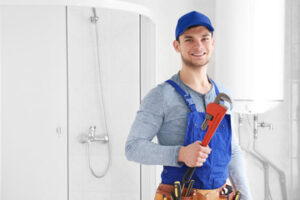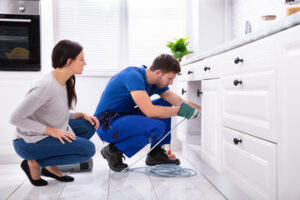Plumbing is a business that requires a lot of hands-on interaction with clients. This makes it difficult to make a steady income.

A strong plumbing brand builds a trusting relationship with the client that makes them feel secure in calling you for any future needs. This type of branding can lead to increased revenues. Contact Ranger Plumbing Company for professional help.
If you run a plumbing business, a professional logo design will help you stand out from the competition. A good plumbing company logo design communicates your services, professionalism, and core values. It will help you build trust with clients and grow your business. It also helps potential customers understand if your services are right for them.
Your plumbing company logo can be used on your website, social media, and other marketing materials. It should be simple, clear, and easy to read at different sizes. It should also incorporate your brand colors, which are important for establishing your brand identity. Color has the power to influence people’s emotions, and it can also communicate your personality and tone of voice.
Plumbing company logos can include icons such as pipes, faucets, or water droplets. They can also be a stylized version of the name of your business or a mascot that reflects the niche in which your business operates. In addition, your plumbing logo should convey a sense of reliability and expertise. Make sure the fonts you choose are easy to read and match your brand’s aesthetic. A well-designed plumbing company logo will stay in the minds of your audience, allowing them to easily recall your brand.
Starting a plumbing business is an exciting venture that requires many responsibilities and decisions. You will need to choose the right business structure and acquire the necessary licenses and permits. You will also need to determine your budget and hire a team of employees to ensure the success of your business. A good start-up plan will help you avoid common mistakes and improve your chances of success.
The initial impression your plumbing company makes on a client is crucial for their decision to schedule service appointments with you. A positive first impression can lead to new customers, as well as referrals from existing ones. To make a lasting impression, you need a memorable and unique brand identity that is reflected in your logo and other branding materials. A great plumbing logo will separate you from amateur plumbers and encourage homeowners to select your services.
Website Design
A quality plumbing website must have a fast load time to ensure that prospective or current clients can find the information they are looking for quickly and easily. If not, they will leave the site and search for another option. Fortunately, there are several ways to improve the loading speed of a plumbing site. These methods include reducing the number of images or videos, optimizing the content for the search engines and using proper coding. Regardless of the strategy chosen, a plumbing company should test the website’s load times and continue to monitor them for performance after it has launched.
The homepage of a plumbing website should feature clear visuals and a call to action. This will encourage visitors to contact the plumber and begin the process of scheduling an appointment. It should also include a list of the services offered by the plumber and a link to its reviews and testimonials. Providing this information will help the customer feel confident that the plumber is reliable and trustworthy.
In addition to a good design, the website should be responsive to different screen sizes and devices. This can be done by using special coding that will automatically adjust the site to match the dimensions of the screen used to view it. This will give the customer a better experience and will help to increase its visibility in the search engine results page (SERP).
When choosing a color scheme for your plumbing website, it is important to keep in mind that different colors can evoke different emotions. For example, brighter colors may evoke a positive response from homeowners, while darker colors can make a website seem professional and trustworthy. It is also important to choose fonts that are easy to read and are consistent with the overall theme of the site.
It is important to keep in mind that a majority of potential clients start their journey on the search engine results page (SERP). These people are typically searching for a plumber near them who can respond to a plumbing emergency and has a good reputation. To rank higher in the SERP, a plumbing company must utilize keyword research to determine which keywords are relevant to its target audience. It should then use these keywords throughout the website in titles, tags and other metadata, as well as in the content of its pages.
Social Media Marketing
We help you reach your local audience where they spend most of their time online. With a strategic social media presence, you’ll be able to showcase your plumbing expertise and build trust with potential customers. We combine high-value content with responsive customer service to create a meaningful connection with your target audience. Our team of experts will help you optimize your social media platforms for maximum performance and engagement.
Local SEO is the process of optimizing your website and online presence to rank higher in local search engine results. This helps you attract more local traffic, which in turn leads to more customers and business growth. We’ll make sure your website is properly structured, keyword optimized, and has quality backlinks to increase your search engine ranking. We also work on improving your Google My Business Listing and other local directories to get you in front of more customers.
Having an active email marketing campaign is crucial for maintaining customer relationships and nurturing new leads. We can integrate a dedicated email sign-up bar on your website or use pop-up emails to encourage site visitors to sign up. Then, we’ll send targeted email campaigns to nurture prospects and promote special offers. We’ll test different subject lines, content, and sending times to determine what works best for your plumbing business.
Engaging posts that provide valuable information and solutions are a great way to demonstrate your plumbing expertise. We’ll share informative articles about common plumbing problems, helpful tips, and even humorous images of plumbing mishaps. This type of content is timeless and provides a strong credibility boost for your plumbing business.
Targeted ad campaigns allow you to reach a specific audience and generate leads in real-time. We can also create visually appealing and creative ad content to stand out against the competition. We’ll use the latest ad formats like Social Mirror Ads to maximize your impact on social media and drive qualified traffic to your website. We’ll then track and analyze performance metrics to refine your advertising campaign.
SEO
SEO services improve a plumbing company’s visibility in search engine results pages (SERPs). By optimizing the website for relevant keywords and local search terms, these strategies help to generate more organic traffic. In turn, this leads to more calls and appointments from potential customers.
In order to rank highly in search engines, a plumbing website needs to be mobile-friendly and optimized for speed. This allows users to access information quickly and easily, resulting in higher conversions. Furthermore, a user-friendly website provides an excellent opportunity to showcase the plumbing services offered by your business. This helps to build trust and increase customer engagement, boosting your online presence and ranking.
To maximize your plumbing SEO, your website must contain relevant, high-quality content. This includes blog posts, service descriptions, and more. Focusing on specific keywords is essential, as these words are most likely to be searched by people looking for a plumber in your area. Using the right keywords can lead to more traffic and conversions for months or even years after your content is published.
Boosting your plumbing SEO also involves improving your website’s structure and technical elements. This can be done by ensuring that titles and meta descriptions are optimized, as well as implementing structured markup and other technical optimizations. Structured markup is the code that makes knowledge panels and featured snippets appear on Google search results pages.
Another way to boost your SEO is by optimizing your online presence. This can be done by claiming and optimizing your Google Business Profile, as well as promoting your business on social media. Additionally, it is important to encourage your satisfied customers to leave reviews on Google and other online directories.
The most effective plumbing marketing strategies include both on-page and off-page optimization. On-page SEO involves optimising your website’s content and structure, while off-page SEO focuses on building high-quality backlinks and increasing domain authority. When combined, these strategies can significantly improve your plumbing company’s SEO. By appearing on the first page of Google’s SERP, you can attract more qualified traffic and increase your chances of converting visitors into clients.

